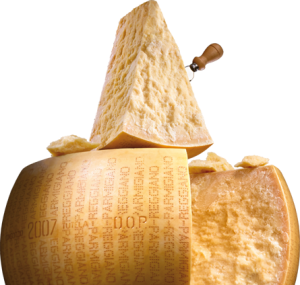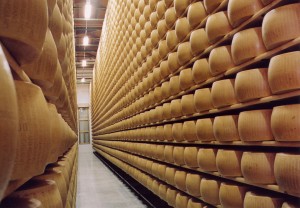Parmigiano Reggiano
 When it is said that Parmigiano-Reggiano cheese has been “a great cheese for at least nine centuries”, it is not only highlighting its ancient origin. Indeed, it means pointing out that this cheese today is still identical to how it was eight centuries ago, having the same appearance and the same extraordinary fragrance, made in the same way, in the same places, with the same expert ritual gestures. Historical evidence shows that already in 1200-1300, Parmigiano-Reggiano cheese had reached its perfect typicality that has remained unchanged until the present day. Today like in the past, cheese masters continue in their effort and in their risk by sincerely and proudly persisting in making their cheese with solely milk, rennet, fire and art, and in abiding by the rigorous centuries-old methods and application of the technique that is the result of special vocations and matured experiences.
When it is said that Parmigiano-Reggiano cheese has been “a great cheese for at least nine centuries”, it is not only highlighting its ancient origin. Indeed, it means pointing out that this cheese today is still identical to how it was eight centuries ago, having the same appearance and the same extraordinary fragrance, made in the same way, in the same places, with the same expert ritual gestures. Historical evidence shows that already in 1200-1300, Parmigiano-Reggiano cheese had reached its perfect typicality that has remained unchanged until the present day. Today like in the past, cheese masters continue in their effort and in their risk by sincerely and proudly persisting in making their cheese with solely milk, rennet, fire and art, and in abiding by the rigorous centuries-old methods and application of the technique that is the result of special vocations and matured experiences.
Parmigiano-Reggiano cheese is often one of the most expensive cheeses when it is bought at delicatessen counters or at supermarkets. However, we can make some considerations in this respect and prove that it is not exactly like that. First of all, it is a hard-paste and long-maturation cheese. This means that its water content is only approximately 30%, i.e. it is a highly concentrated cheese, where the nourishing substances present in milk (casein, fat, mineral, vitamins, etc.) undergo a special drying process, or more appropriately dehydration process, both during production in the dairy and in the maturation rooms. Therefore, when you buy a hundred grams of Parmigiano-Reggiano cheese, you are actually taking home about 70% nourishing substances. Instead, if you buy other soft or fresh cheeses (which can also be very tasty) the water content can be up to 50%. The quantity of nourishing substances bought is definitely not the same.
 You must also consider that to achieve its top quality level, Parmigiano-Reggiano cheese takes at least 24 months. This means that at least two years go by between the moment the cheese is made and the time the consumer purchases it to eat it, so that producers and maturers will not earn any money for all this time and, as you know, “time is money”, or better the money invested is costly!
You must also consider that to achieve its top quality level, Parmigiano-Reggiano cheese takes at least 24 months. This means that at least two years go by between the moment the cheese is made and the time the consumer purchases it to eat it, so that producers and maturers will not earn any money for all this time and, as you know, “time is money”, or better the money invested is costly!
Finally, we should not forget that the dairy cows making milk for Parmigiano-Reggiano cheese are mainly fed with hay from the area of origin and are not allowed to eat other fodder (e.g. fermented forage) which is cheaper, but would give rise to quality problems during the maturation phase. We say all this to prove that it is not only a valuable cheese, but it is also worth its price.
It is not an advertising gimmick, it is actually true! Parmigiano-Reggiano is made every day by many cheese masters who turn milk into cheese. Certainly, the milk processed is a special kind of milk, coming from cows fed in a certain way and this does facilitate the cheese masters’ task, but it does not make it easy. Cheese masters really make cheese using their hands and heads. It is their decisions that determine the cheese quality. They decide how long the evening milk should rest to let the cream rise, they decide how much fermented whey and how much rennet should be used, they supervise the cooking stage to check the degree of dehydration of the curd grains by touching them with their hands. Then, they spend their time taking care of the cheese through every stage until complete maturation is achieved.
 Two important things must be pointed out. Firstly, this transformation from milk into cheese takes place without any processing aids, i.e. without any additives (no additive is allowed in the production of Parmigiano-Reggiano cheese) to correct faults caused by milk quality non-conformities. Secondly, this work, which is truly an art, is carried out every single day without interruptions, including Sundays and holidays because the milk, which is raw, must be processed every day and cannot be preserved in any way.
Two important things must be pointed out. Firstly, this transformation from milk into cheese takes place without any processing aids, i.e. without any additives (no additive is allowed in the production of Parmigiano-Reggiano cheese) to correct faults caused by milk quality non-conformities. Secondly, this work, which is truly an art, is carried out every single day without interruptions, including Sundays and holidays because the milk, which is raw, must be processed every day and cannot be preserved in any way.





Leave a comment